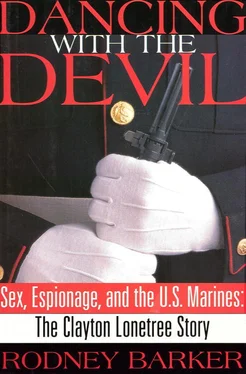A workable compromise was still a long time in coming, and the form it took was so constitutionally questionable it posed an entirely new threat to the prosecution’s case.
In the vaguest of terms it was explained to Major Beck that the individual who had identified George was an important agent involved in a sensitive intelligence operation in Vienna. Beck was told that the only way this man would be allowed to testify was if acquittal was truly at stake, and then it would have to be under the condition that his identity be protected. He would enter the courtroom as a man with no name, no history; the scope of his testimony would be limited to the fact that he personally observed the appearance of an officer of the Soviet KGB at a time and place that had been identified by the accused as having been established for a clandestine meeting; he would not have to answer any questions about the planning, conduct, and techniques used in the surveillance of the meeting site; and then he would leave.
There were significant risks in calling a “hooded witness,” the most obvious being the Sixth Amendment right of an accused to confront his accusers. And even though there were precedents in civilian courts with government informants, there was nothing on the military side. If he agreed to these terms, Beck knew, there was a good chance that the judge would not allow the man to testify; and an even greater possibility that even if Judge Roberts ruled in the prosecution’s favor, an appellate court would rule an error had been committed and would overturn a conviction. But in Beck’s view there was an even greater risk of an appellate court’s looking at the record of trial and deciding each element of the offense had not been corroborated. And since there did exist a witness who from a legal perspective could provide incontrovertible corroboration, he was willing to gamble.
When the prosecution introduced the motion in the pretrial proceedings, the defense argued strenuously in opposition. The motion was flagrantly unconstitutional. The credibility of the witness was crucial to his testimony, but in order to determine that, they had to know who was testifying, what his qualifications were, and how reliable an eyewitness he was. If the judge were to allow this individual to testify unchallenged, he would be hampering the defense’s ability to prepare and defend this case properly.
When Judge Roberts granted the government’s motion, everyone was shocked. For Kunstler and company it revealed the military judge’s pro-government bias. It convinced them a fair trial was impossible and their client was being railroaded toward a conviction. Even Major Beck was surprised. He wasn’t sure that if he had been sitting on the bench, he would have ruled the same way.
Although he expressed no equivocation at the time, Judge Roberts himself wasn’t absolutely convinced he had made the right decision. This was new ground in military jurisprudence. There were very few applicable precedents to guide him. Before ruling, he had done what he thought was appropriate in a case where the interests of national security weighed adversely against the rights of an accused: he had gone back to the classifying authority to determine whether they had valid concerns. And he had seen a top-secret affidavit in which the CIA maintained that the witness was involved in an ongoing operation; if his cover was blown, it would be dangerous to him personally and to other people involved, and if the flow of information he was providing was cut off, it would be detrimental to national security. Roberts, like Major Beck, was not sure his ruling would get past the appeals stage, but at the time he felt the immunities could be justified.
Not until now were Mike Stuhff and William Kunstler willing to consider a plea bargain seriously. They had lost all their legal motions. They felt nothing they said had made an impression on the judge. And all along Major Henderson had been saying to them, “Guys, we really ought to plead this case. The evidence is overwhelming. Our client is standing against a wall and there are fifteen police officers with guns pointing at him—it’s time to surrender.”
The meeting to discuss the terms of a pretrial agreement was held in the staff judge advocate’s office at Quantico and was attended by senior Marine legal officers, the prosecution, and the defense. William Kunstler let it be known straightaway that he found this proceeding distasteful both personally and professionally. “I do not believe in plea agreements with the government, and I don’t believe we should be pleading in this case,” he said. “Our client has been grossly overcharged. If he is guilty of anything other than poor judgment, it is in bringing necessary attention to the weaknesses in the State Department’s security system and the unclean hands of the NIS and other intelligence agencies. However, even though there are substantial issues, both legal and factual in this case, which very well could be resolved in Sergeant Lonetree’s behalf if we were to continue with a trial, we would be willing to plead guilty to violating regulations regarding contact with foreign nationals and failure to report them, in exchange for dismissal of the espionage charges and a sentence limitation of two years.”
It was clear to everyone in the room that William Kunstler was not just blowing smoke; he really did believe that two years was all this case was worth. What was not apparent to him, however, was that the Marine Corps viewed Lonetree’s transgressions as a lot more serious than he did. In their eyes, for a Marine to cooperate and conspire with the enemy involved a betrayal of all the values—patriotism, tradition, Semper fidelis —that the Corps stood for, and was not just a two-year offense.
Moreover, although plea bargaining can take place at any time, its success depends on what the different parties bring to the table. Had the defense come up with an offer earlier in the process, as Major Henderson had advocated, the prosecution would have had something to gain. A deal would have saved the government time and the money it cost to bring in witnesses. At this stage the defense had nothing to trade, and the prosecution no incentive to accept.
“No prosecutor in the world can convict my client of espionage,” Kunstler continued. “And even assuming one could, because of the mitigating circumstances we can walk him in eighteen months or less. So really, the government is getting a bargain here.”
At that point, Col. Patrick McHenry turned to Major Beck and asked him what he thought of the proposal.
In a show of deference that to all the room seemed genuine, Beck shrugged his shoulders. “I realize Mr. Kunstler is from the big city and has all the experience in the world and has tried some very important cases,” he said. “And I have no doubt he knows a whole lot more than me. But Colonel…”
A beat later, displaying a dead-on instinct for timing, Beck finished his thought. “I am absolutely confident the prosecution can get a conviction in this case. And any plea bargain that does not include pleading guilty to espionage, because that’s what he did, with anything less than twenty to twenty-five years, should not be considered.”
There was only one order of business left before the trial was to start: the voir dire process, during which both the prosecution and the defense were given an opportunity to question those selected for jury consideration. William Kunstler lodged a protest, saying basically that asking a jury of Marine officers to sit in judgment of a Marine accused of espionage was tantamount to trying a case of corporate malfeasance before its board of directors. But under questioning, each of the officers indicated he had no preconceptions about the defendant or the case. Every potential juror answered, “Yes, I could,” when asked by Major Beck, “If at the end of the evidence on findings, you, sir, have concluded that the accused is guilty of the most serious offenses charged, and at the end of presentation of evidence on sentencing, you are convinced that the maximum punishment in this case was appropriate, would you be able to come back into the members box, look the accused in the eye, and have a sentence announced that includes confinement for life?” and every one answered the same when asked by the defense, “If you felt there was some reasonable doubt, would you be able to come back, look government counsel in the eye, and announce a sentence of not guilty?”
Читать дальше












